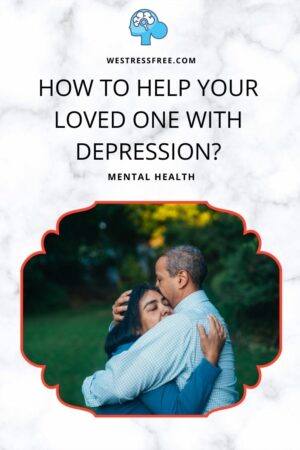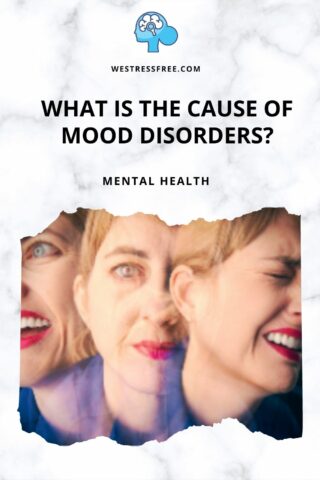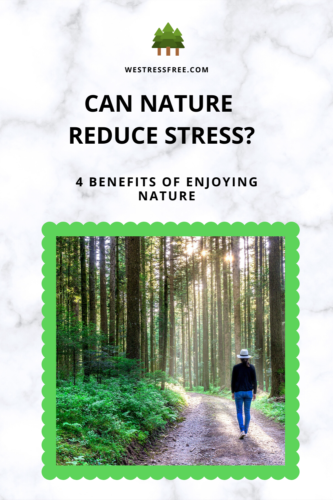CAN NATURE REDUCE STRESS? – Benefits Of Enjoying Nature
In everyday life, we are often faced with problems that originate from family, work, or friends. These problems cause stress.
Generally, stress arises when a person is in a state of stress, feels burdened, or cannot overcome the problems that come in life. Stressful conditions are common for people with dense routines and little time to relax.
You do not have to spend money to relax. When stress comes, try to return to nature. Can nature reduce stress? What are the benefits of enjoying nature? Let’s find out from the review below.
Can Nature Reduce Stress? – Benefits Of Enjoying Nature

Connect to nature to reduce stress
I used to be spending time in nature back when I was a tour guide. The company I worked for offers a river cruise boat along the rivers in my hometown. The boat will pass forests, riverside villages, and orangutans protected sanctuary. I missed it. Nature has some kind of positive aura that can refresh me from working in front of the computer from 9 am to 5 pm during the week. It also helped me to reduce my stress.
Relieving stress does not have to always use antidepressant drugs or go to a psychologist.
In general, stress is often caused by activities and lifestyles that are unhealthy. Rather than taking drugs or spending money by going to a psychologist, it helps you try to relieve stress first by going to enjoy nature.
Also read: 10 BEST WAYS TO RELIEVE STRESS
4 benefits of spending time in nature to relieve stress – Positive effects of nature

Research published by Michigan University found, by walking in nature such as hiking, fishing, or hiking, can reduce the level of anxiety to mental stress.
Another study conducted by Harvard Medical School suggested that getting back to nature can help to get our mood back.
The mental health hazards are closely related to the risk of physical health decline.
A stressed body will be susceptible to viruses and disease-causing bacteria.
=====> Brain boost buy 2 get 1 free <=====
The following are 4 benefits of spending time in nature to relieve stress on the body and reasons why nature is good for you:
1. Nature has the same effect as meditation

Researchers in Japan have found a decrease in human brain activity in the area of the prefrontal cortex when you spend time exploring nature. That part of the brain functions to plan and is responsible for decision-making and problem-solving.
The effects of walking or enjoying nature have been observed in a group of monks in Tibet. The results state that monks who often interact, for example just walking on the hill, can feel the effects of meditation and body relaxation which can relieve stress and anxiety.
2. Nature helps you to sleep better

For those of you who like to feel panic and anxiety, often even worse with less restful sleep problems. Unfortunately, these three things often lead to symptoms of stress.
To relieve stress on the body, experts recommend more often under the morning sun exposure. Because the substance serotonin that radiates to the body can raise the mood and make your mind more positive. So that the body can avoid stress and sleep can be more soundly.
Also read: Understanding the Difference between Stress and Anxiety
3. Nature prevents the hormone cortisol to rise

Cortisol is a hormone that is responsible for stress in the body. When you feel stress, more and more cortisol hormone comes out in the body. Scientists in Japan found that the level of cortisol decreases by 12%, by walking in the forest. The atmosphere, temperature, and green color of leaves in nature can be useful to relieve stress and anxiety for sufferers.
4. Nature makes you happier

There are many reasons why nature makes you happier and also relieves stressful thoughts. The most basic reason is, humans essentially like things that are closely related to the source of their survival.
For example, humans like to swim in the sea or fish in rivers, where water and fish are the source of life for drinking and eating. That is also why the sound of water gurgling is liked a lot because water is indeed an element of life.
It doesn’t hurt for you to take time and go exploring nature. Because you need or recharge energy through nature, which is the source and the element of life that is closest to you.
The sounds of nature and the green environment have long been associated with human relaxation and well-being over the past hundreds of years. Examples such as the sound of waves, birdsong, and gusts of wind to trees are believed to calm the human mind. But, how can the influence of natural sounds relax the body and mind?
Is it true that the sounds of nature relax the body and mind?
 A study conducted by Brighton and Sussex Medical School examined and researched 17 adults using a magnetic resonance scanner (fMRI). They were told to hear 5 different series of original natural sounds and man-made natural sounds for 5 minutes.
A study conducted by Brighton and Sussex Medical School examined and researched 17 adults using a magnetic resonance scanner (fMRI). They were told to hear 5 different series of original natural sounds and man-made natural sounds for 5 minutes.
The researchers also used brain scanners, heart-level monitors, and behavioral experimental tests to infer physiological causes of these natural sound effects.
Each natural sound recording is different, participants are assigned to measure the focus of their thoughts and reactions. Their heart rates are also seen to build upon the autonomic nervous system. Beside heart rates, they also monitor the organ systems involved in this process, such as breathing, blood pressure, body temperature, metabolism, and digestion.
Can nature reduce stress? – Effects of nature on mental health
Natural sounds tend to produce a relaxed and calm effect on the body
When researchers studied participants’ fMRI results, they noticed that there was activity in the brain’s innate fashion network, which is the area involved in the participant’s mind to calm down.
However, the resulting brain activity varies, depending on the natural background sound played in the test. Specifically, the results were found if natural sounds made by humans had an impact on the participants’ minds being focused on nature. While the natural sound of nature has the effect of pushing the external attention of the participants to be more focused on themselves.
Attention is generated from natural sounds, which include things that are more specific and are associated with conditions that involve psychological distress. Examples include depression, anxiety, and post-traumatic stress disorder among participants. Then, the participants’ reaction time was also slower when they listened to artificial sounds compared to natural sounds.
Besides, differences in heart rate among participants were also found. They show the body’s autonomic nervous system response when they hear the original natural sound. And overall, the sound of nature is associated with a decrease in the body’s sympathetic response (feeling dissatisfied and rebellious) and an increase in parasympathetic response that makes the body relax and function under normal conditions, called a rest-digest response.
How nature affects the brain
 Can you remember when was the last time you spent a good time in nature? Research has long documented how spending time in the wild (and not just traveling from place A to place B) can have many benefits for your overall well-being and mental health.
Can you remember when was the last time you spent a good time in nature? Research has long documented how spending time in the wild (and not just traveling from place A to place B) can have many benefits for your overall well-being and mental health.
A research published in The Journal of Positive Psychology in 2018 discovered that spending five minutes outside the home was associated with significant mood improvements.
In that study, some students at the University of Regina in Canada were evaluated in a lab room with no window versus a group in nature, where students sat on a bench in a “city park” on campus. Not surprisingly, students who sat on the bench who experience five to fifteen minutes in nature reported a certainly improved emotional states through significant increases in positive emotions and spiritually enlightened. The results of the study was not affected by the amount of time they spent outdoors.
=====> Brain boost buy 2 get 1 free <=====
Quoted from the Bustle page, here are five ways that are in nature that can affect your brain.
1. Mental health boosts
A long-term study published in Environmental Science & Technology in 2014 found that, on average, people who move to greener areas experience an immediate increase in mental health and less mental stress. Improved mental health is also durable, maintaining its effects even three years after moving.
This study adds to the growing evidence in support of integrating more green spaces such as public parks in cities to improve public health.
The lead researcher, Dr. Ian Alcock, said that the results of these studies are significant for urban planners who would like to introduce new green spaces to our cities because local communities can get long-term and sustainable benefits from those green spaces.
2. Reduces depression
A research finding that was published in PNAS in 2015 showed that participants who walked for 90 minutes through a green park on campus, compared to walking near a nearby highway, revealed a “calmer” brain and less attention to negative aspects of their lives (vs. how they felt before the walk) in advanced brain scans and questionnaires.
They also experience decreased activity in the subgenual prefrontal cortex, an area of the brain associated with depression. Walking in nature has been shown to have an almost immediate positive effect on overall mood.
3. Improves overall health
A comprehensive analysis of 143 studies published in 2018 in Environmental Research, discovered that green spaces offer health benefits in humans such as an increase in heart rate and blood pressure, a significant reduction in cholesterol levels, an increase in sleep duration and neurological outcomes. They are also associated with reductions in the universality of type II diabetes, cardiovascular mortality, and overall mortality.

4. Different “levels” of nature can have different effects
Depending on the “level” of nature you are surrounded yourself in, you can also get a variety of benefits. According to a 2018 study published in Behavioral Sciences. This study was conducted in three different “levels”, or settings: the first level had characteristics such as wilderness, another location closer to the greenery that you could find in public parks, and the final place was a common “artificial environment” (human-made environment like an indoor fitness center).
The researchers discovered that going both green environments was very helpful in reducing physical and psychological signs of stress in participants, however, people in the wilderness reported the most significant reduction in stress levels, relative to the other two groups.
If you want to make the most of your time outdoor activities, taking a hiking or camping trip might be the best choice.
5. Helps improve short-term attention function
Inspired by an important 2008 study published in Psychological Science that suggests looking at nature photos can improve the function of attention in young adults, a 2014 study published in Experimental Aging Research discovered that executive attention was seen to increase both in older adults (64 to 79 years old) and university-aged subjects (18 to 25 years) after brief exposure to photographs of nature.
Great news for city people who have less access to nature: participants’ attention immediately before and after seeing photographs of nature are measured, and research has discovered that seeing these photos increases attention and short-term memory in both age groups.
Not everyone feels the same effect
 However, these results are not the same for everyone. For some people who have a high sympathy response when researching, the results of this test noted the benefits of great relaxation from nature for that person. Whereas people who start with a low sympathetic response, they experience a slight increase in body relaxation when listening to natural and artificial sounds.
However, these results are not the same for everyone. For some people who have a high sympathy response when researching, the results of this test noted the benefits of great relaxation from nature for that person. Whereas people who start with a low sympathetic response, they experience a slight increase in body relaxation when listening to natural and artificial sounds.
The sounds of nature, open nature with a green atmosphere are indeed refreshing for the mind and body.
Researchers also suggest, even a few minutes walk in nature can provide the benefits of calm in the body. Even if you can’t walk in the open nature, you can simply listen to the recorded nature sounds to relax and calm your mind.
Also read: Benefits of MUSIC THERAPY for STRESS
Negative effects of nature on humans
Natural disasters can cause mental disorders – How does nature affect depression?
It seems like almost nothing good comes after a natural disaster. In addition to material losses, victims of natural disasters will also be plagued by deep grief due to loss of family or relatives, shock, to trauma that results in mental disorders.
Through a study on the victims of the Hanshin-Awaji earthquake, Japan, in 1995, Kato H and his colleagues found the fact that survivors of the earthquake suffer from sleep disorders, depression, irritability, and hypersensitivity. Similar research was also conducted by Masahiro Kokai and his research team, published in the journal Psychiatry and Clinical Neurosciences (2004), entitled ‘Natural Disaster and Mental Health in Asia’.
The study then discovered the term psychiatric morbidity, which means the physical and psychological damage caused by psychiatric conditions. The results of the study also showed that anxiety disorders as a direct impact of multiple traumatic events were found in the first month after the earthquake.
Generally, natural disaster victims experience depression. They will usually be unemployed while continuing to think about the burden of rebuilding their homes and having difficulty adjusting to the relocation site.

Post-traumatic Stress Disorder (PTSD) lurking
Of the various types of mental disorders, Post-traumatic Stress Disorder (PTSD) is one of the most common types of disorders experienced by disaster victims. PTSD is a mental condition when someone experiences a panic attack that is triggered by the trauma of the past. The horror of the natural disaster experienced can be one of the things that might have left an impression on the victims’ minds. That is why many victims of natural disasters are vulnerable to mental disorders on this one.
Also read: Helping Someone with Panic Attack
Although it can occur in everyone, both men and women, adults and children, according to research, PTSD is more experienced by women. Because, women are generally more sensitive to change than men, so they will experience more intense emotions. Besides women, PTSD is also vulnerable to occur in children. If not handled properly, it will carry over into adulthood.
Before experiencing PTSD, there will usually be an acute phase that lasts from 3 days to 1 month after trauma (acute stress disorder). If not treated properly, the acute stress disorder can progress to PTSD.
Please note that, in the human brain, there is a part called the amygdala. The amygdala is the center of fear. When psychological disorders occur due to a traumatic event, the amygdala will be activated and send signals to various other brains. Like for example when the amygdala sends a signal to the brain stem, there is an increase in heart rate and peripheral blood vessels to shrink so that people turn pale.
The amygdala also sends a signal to the center that regulates breathing, so that the breath of the person who is traumatized becomes short or fast. The event of a great fear will be stored to a part of the brain called the hippocampus which will bring up repeated traumatic events, not the same as ordinary memory storage. Traumatic disaster memory is stored deeper and longer, difficult, or impossible to disappear.
***
Now you know the benefits of spending time in nature. It can help to reduce stress and improve your overall health and well-being.
If you have questions, consult your doctor for the best solution for your problem.
Stay safe, happy, and healthy!
Ferra ?
—————————————————————————————————————————————–
This post may contain affiliate links, which means I make a small commission off purchases, at no extra cost to you. Read my full disclosure here. Thank you for supporting the work I put on this site!
—————————————————————————————————————————————–
We Stress Free does not provide medical advice, diagnosis, or treatment. However, if you need someone to talk to and want to make friends, please feel free to reach me at ferra@westressfree.com. If you would like to REDUCE your STRESS and are interested to do an ONLINE THERAPY, you can do so here.
———————————————————————————————————-—————————-
Disclaimer: The information contained in this website is for educational and informational purposes only and is not intended as health or medical advice. Always consult a physician or other qualified health provider regarding any questions you may have about a medical condition or health objectives.
Thank you for reading today’s topic: Can nature reduce stress? – Benefits of enjoying nature















Hi Ferra,
Revisiting nature does help us to relax and meditate. I live in Singapore. So when I get the time to travel, its most often somewhere I can go for hikings and trekking to really immerse myself and ‘refresh’ my system.
Personally, listening to the sound of nature before I sleep helps me too!
Great article.
Cheers,
SAM
Hi Sam,
It is so nice to hear that you get an easy access to beautiful nature there.
Thank you for visiting my site and reading this post.
Glad to know that you found this post useful. ?
I really appreciate your kind words, sharing, and support.
Stay safe, happy, and healthy!
Ferra
Ferra,
What a thorough, inspiring and informative post!
I could not stop reading.
We are outdoors, nature people, starting with my grandparents who were landowners and farmers. My father was a seaman, so I get that love and joy from him. Being from the Caribbean, we are never far from nature – sea or land.
What you reminded me of is how nature’s environment contributes so much to us and, for FREE! What more could we ask for?
“You do not have to spend money to relax.” This is so very true when it comes to nature. I would really like to see more people enjoying these blessings.
Thank you for sharing your love with us.
Cassandra
Hi Cassandra,
Wow, I would love to go to the Caribbean one day. It is such a beautiful place. You’re so blessed!
Thank you for visiting my site and reading this post.
Glad to know that you found this post useful. ?
I really appreciate your kind words, sharing, and support.
Stay safe, happy, and healthy!
Ferra
Hello. What a great read. I too believe that getting back to nature has many health benefits.
I love taking walk in the forest. I always feel refreshed mind, body and soul after spending some time there.
Hi Felicity,
Thank you for visiting my site and reading this post.
Glad to know that you found this post useful. ?
I really appreciate your kind words, sharing, and support.
Stay safe, happy, and healthy!
Ferra
Just by reading this post about nature and its benefits on stress reduction makes me feel calm and relaxed. It’s true indeed that nature is the best cure for every condition. Thanks for sharing this post. I like your site too! Keep up the good work!
Hi Ivan,
Thank you for visiting my site and reading this post.
Glad to know that you found this post useful. ?
I really appreciate your kind words, sharing, and support.
Stay safe, happy, and healthy!
Ferra
I have a personal experience with this. I would say the nature cures many illnesses especially it protects the mental wellbeing.
Your post has just reconfirmed all this. Many thanks for sharing this with us so everyone cn benefit from it.
Kind Regards
Hi Habib,
Thank you for visiting my site and reading this post.
Glad to know that you found this post useful. ?
I really appreciate your kind words, sharing, and support.
Stay safe, happy, and healthy!
Ferra
Spending some time in nature, especially watching or swimming in clean rivers and sea, definitely calms me down. So I’m certain that nature can reduce stress. Unfortunately, many of us don’t have the time to be and enjoy being in nature.
Great article. Love it.
Hi Tanya,
You’re right. Some people don’t have the time and easy access to enjoy nature. So they should find some other ways to relieve their stress like listening to music, doing hobbies, etc.
Thank you for visiting my site and reading this post.
Glad to know that you found this post useful. ?
I really appreciate your kind words, sharing, and support.
Stay safe, happy, and healthy!
Ferra
Thank you so much for this highly informative article, Ferra! God blessed us with a beautiful world, and he certainly meant for us to enjoy nature and remember his love and grace toward us by becoming one with it. When I’m stressed out, laying in the grass and staring at the sky helps me to feel better-I love looking at the clear blue (or starry black) sky, I love breathing in the fresh air, I love hearing the sounds of birds chirping, and I love drawing closer to God. I definitely breathe easier, feel happier, my thoughts are lighter/more pure, and I sleep like an angel. Haha Nature is an excellent stress reducer. Great read! God bless you!
Hi C.N.,
God is the best Creator. We are so blessed to live in this beautiful world, so we have to take care of it and it will take care of us.
Thank you for visiting my site and reading this post.
Glad to know that you found this post useful. ?
I really appreciate your kind words, sharing, and support.
Stay blessed, safe, happy, and healthy!
Ferra
Yes, nature can reduce stress. I am fortunate to live close to parks, mountains, forests, rivers, lakes, etc. and know with certainty that my stress levels drop significantly when I am enjoying nature. Thank you for sharing this information – I can’t wait to get back to the mountains soon. ?
Hi Michael,
How lucky! I envy you. We live in the desert here in Arizona, but there are some places like Sedona, Grand Canyon, etc where we can hike and enjoy beautiful nature.
We just have to go when the season is right though he he…
Thank you for visiting my site and reading this post.
Glad to know that you found this post useful. ?
I really appreciate your kind words, sharing, and support.
Stay safe, happy, and healthy!
Ferra